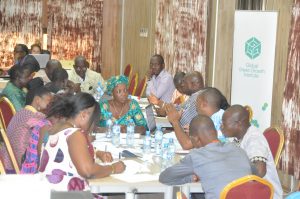
On July 11, in Ouagadougou, Burkina Faso, the Ministry of Habitat and Urban Planning and the Global Green Growth Institute (GGGI) organized a workshop to launch the development of guidelines for green cities in Burkina Faso. This process closely involved a variety of representatives from affected Ministries, the cities Ouagadougou and Bobo-Dioulasso, as well as from the private sector, civil society, and development partners.
With coherence to the National Policy of Habitat and Urban Development for Burkina Faso, the development of Green City Guidelines benefitted from the technical guidance of GGGI’s expert on green cities. The aim of the workshop was to develop a common understanding of the vision for green cities in Burkina Faso, as well as to exchange information about and finalize the pillars and strategic axis that form the foundation for the vision. To this end, the workshop was organized around three presentations that were accompanied by discussions and working groups.
During the opening ceremony, the Country Representative of GGGI, Mr. Malle Fofana, drew attention to the main challenges that cities are currently facing such as air pollution, floods, energy consumption, noise control, and heatwaves. He stressed the necessity for cities to transition to the green growth model which is crucial to ensure sustainable urban development. Following the opening speech of the GGGI representative, the Minister of Urban Planning and Habitat, Mr. Maurice Dieudonné Bonanet, expressed his gratitude to GGGI for their support in the development of the Green City Guidelines, “which will serve as a consensual tool of orientation to implement the National Policy of Habitat and Urban Development for Burkina Faso.” Afterward, the Secretary of the Ministry of Habitat and Urban Planning, Mr. Stanislas Bienvenu Goungounga, opened the workshop.
The first presentation started with an introduction to GGGI’s vision and model of green cities, as well as to the National Policy of Habitat and Urban Development for Burkina Faso. The latter anticipates to endow 25% of the municipalities with functional solid waste management systems, reforest 150 hectares of green spaces in urban communities until 2020, develop master plans for operational urban planning and development, and improve rainwater drainage systems.
The second presentation by GGGI’s expert on green cities evolved around the methodology that underlies the study that will serve to develop the Green City Guidelines. The latter envisions an inclusive and consensual approach that involves all stakeholders in the formulation of the guidelines via five steps: (i) the start-up workshop; (ii) a preparatory phase; (iii) an analysis of the obtained results and formulation of propositions; (iv) a strategic diagnosis; and (v) the restitution and validation of the guidelines.
Finally, the expert on green cities presented the eight proposed pillars for the Green City Guidelines and the respective strategic axes. These pillars are:
1. Energy
2. Urban mobility
3. Sustainable territorial planning
4. Green buildings
5. Green urban infrastructure
6. Water and sanitation
7. Waste management
8. Governance
To ensure an inclusive review of the pillars, the participants gathered in working groups to a) evaluate all related national policies, strategies and programs; b) to map all projects and efforts already deployed on a national scale in the domain of green cities; c) to examine the proposed strategic axes; and d) to propose indicators to evaluate the implementation of the strategies.
This workshop offered a great platform for dialogue between leading actors engaged in urban planning in Burkina Faso and GGGI and built a solid basis for the upcoming work around the development of Green City Guidelines for Burkina Faso.